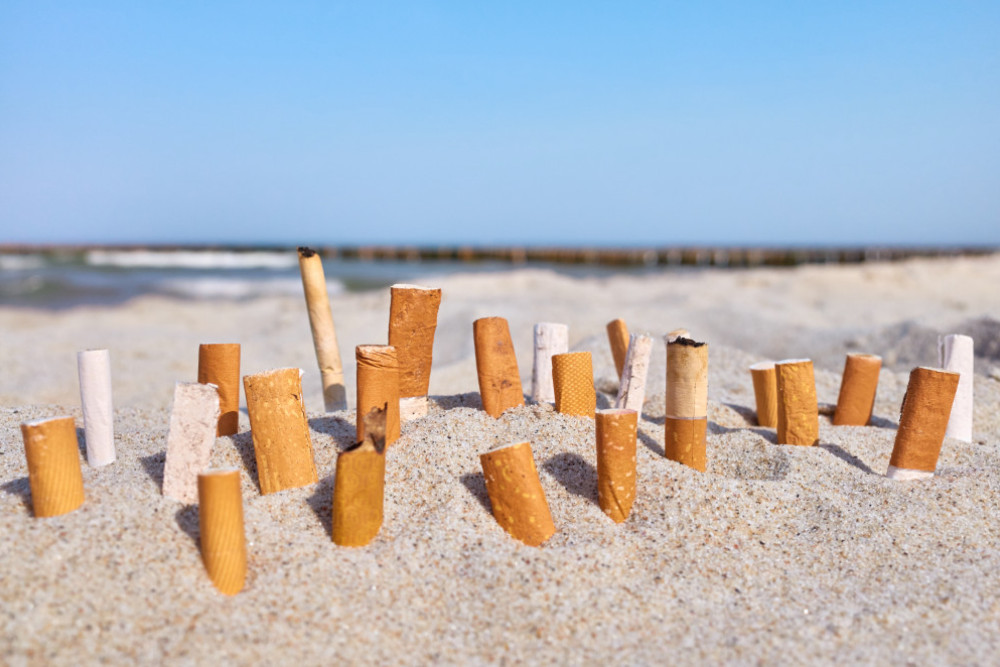General News
27 August, 2021
No Ifs, No Buts, These Butts are Out
THEY’RE small and for most parts probably considered by some to be inoffensive, but for the majority of the population and much of our marine life they are an environmental hazard and highly toxic.

WE are talking cigarette butts here. Last year more than 18 billion cigarettes were smoked every day, a total of 5.6 trillion for the year. Staggering figures when you consider it, with a large percentage used cigarette butts discarded inappropriately.
The World Wildlife Fund estimates that almost 8 billion cigarette butts are littered each year in Australia. Clean Up Australia reports that cigarette butts are over 20 per cent of all recorded litter in Australia.
So why exactly is this a major issue, after all they are only small in size?
A cigarette butt filters are made from a non-bio-degradable plastic (cellulose acetate) and if discarded effectively rendering them single-use. Queensland Health reports that cigarette butts contain significant traces of carcinogens including, benzene, most commonly found in motor vehicle exhaust fumes, arsenic along with compounds commonly found in fungicides, batteries and paints. A rather toxic mix when discarded and left to leech into our natural environment.
In 2009 San Diego State University researcher, Richard Gersberg conducted extensive research into the hazardous habit of discarding a used cigarette butt.
Gersberg evaluated the effects discarded cigarette butts have on marine life and found that the chemical from just one filtered cigarette butt had the ability to kill fish in a one-litre bucket of water.
“The most important finding in this research is that it seems to be the filter, or rather what’s in the left-over filter that is most dangerous to our water,” Gersberg said.
Each year in Australia billions of cigarette butts are discarded with potentially catastrophic effect upon our marine environment.
UNESCO recently moved to list the Great Barrier Reef as endangered. Some of the key issues that needed addressing included marine plastics pollution as well as water quality. A cigarette butt in a marine environment is non-biodegradable and also a source of significant chemical pollution to the marine eco-system.
Shannon Mead, founder of Butts No More believes we have to take significant steps immediately to protect this delicate eco-system.
RELATED: Councils take a hard line on butts
RELATED: Butt out is the message
“With 8 billion cigarette butts littered into the Australian environment annually and approximately 10 per cent of these butts ending up in our waterways we have a serious problem.
“Each cigarette butt takes up to 15 years to break down, this will cause untold damage to our environment.
“We need the governments, manufacturers, retailers and consumers to work collectively for a solution to this problem, but ultimately it’s the consumer who has to take responsibility for safe and appropriate disposal of the cigarette butts.”
Founded in 2020, No More Butts has worked to raise the awareness of the impact these tiny parcels of plastic can have on our environment.
“We are not anti-smoking, that’s a matter of choice for the individual, what we would love to see is the responsible disposal of a cigarette butt or even the recycling of the filter.”
With the introduction of the single-use-plastics ban on September 1 the focus has been on larger more visible plastics. However, a cigarette butt if discarded after use, becomes a single-use-plastic polluting and directly impacting upon our marine life.
Plastics campaigner and author Katherine Nelson is familiar with the impact cigarette butts have on our environment.
Cigarette butts are always a top item we find. “I’m always happy to get these rank little sticks off the beaches, but it never ceases to amaze me how many get tossed into the environment considering how toxic they are!
“Despite less people smoking, they definitely have stayed at the top as the most common types of marine debris found,” Ms Nelson said.
A 2019 report in the UK found that the average person will ingest 2000 microplastic particles each week, the equivalent of a credit card in weight.
“If we use less plastic - individually and collectively - then there will be less plastic breaking up into these microplastics that we then ingest.
“I would like to see governments ban plastics and hold corporations accountable for the plastics they produce and distribute. Fining them and taxing them for the pollution their cheap products inevitably create.”


